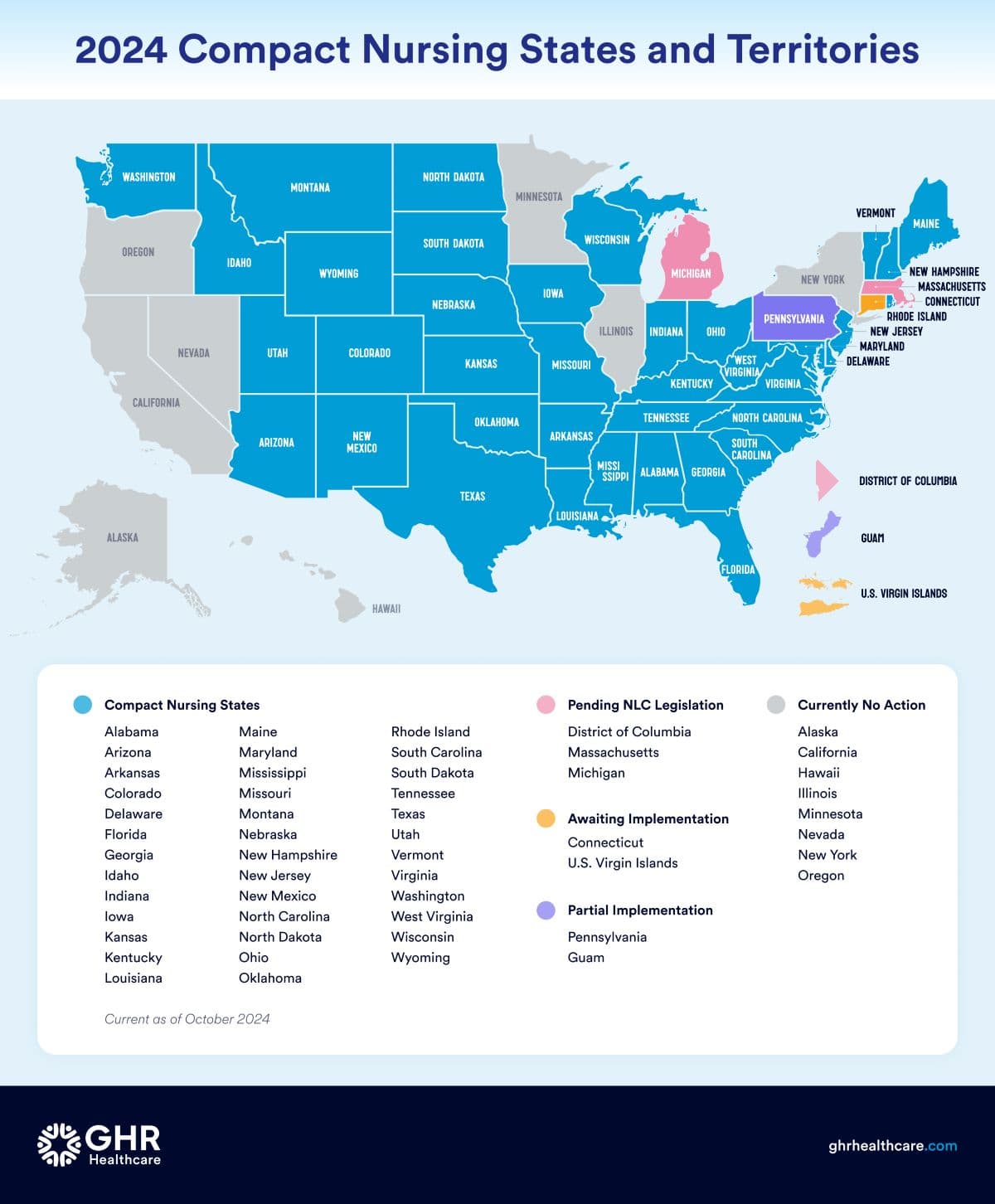
Nurse Licensure Compact (NLC) States: A Complete Guide
October 23, 2024
To be able to practice, nurses must be state-licensed. That means applying, taking an exam, and paying fees. For travel nurses who travel across the country to provide care to those in need, having to get new licenses for every state in which they work can quickly become a hassle—not to mention prohibitively expensive.
The Nurse Licensure Compact (NLC) was created to address this challenge. This multistate license allows nurses to work in all of the states that participate in the compact, giving them a chance to pursue job opportunities they might not otherwise have had access to.
Here’s what you should know about nursing compact states and how you can leverage a multi-state license to boost your career.
What Is the Nurse Licensure Compact (NLC)?
The NLC is an agreement between states that makes it possible for RNs and LPNs to hold a single license to work in all compact nursing states as well as their home state. With the NLC, nurses can work in all these capacities without needing additional licenses.
The program began in 2000, with only a few states participating. By 2015, 25 states had already joined, and as of 2024, 42 jurisdictions participated.
eNLC vs. NLC
The original compact is the NLC, while the newer version of the agreement is the Enhanced Nurse Licensure Compact (eNLC). The eNLC replaced the NLC, bringing further safeguards that maintain public protection at the state level.
It’s important to note that the nursing compact states in the original agreement are not necessarily the same as those in the eNLC.
Which States Are Compact Nursing States?
Nursing compact states are the states that are currently part of the NLC. This means that a nurse who has any of these states as their primary residence and applies for a compact nursing license can work in any of those states.
The majority of U.S states, as well as Guam and the Virgin Islands, participate in this program. As of October 2024, nursing compact states include:
|
|
Note that Pennsylvania and Guam only have partial implementation, while Connecticut and the Virgin Islands are awaiting implementation.
States Pending Legislation
The following states and jurisdictions have pending legislation regarding NLC participation:
- District of Columbia
- Massachusetts
- Michigan

Why Are Nursing Compact States Important?
Nursing compact states offer a number of benefits to nurses, healthcare facilities, and patients.
1. Increases Access to Care
Nursing shortages have impacted facilities across the country, often leaving people in rural communities and isolated locations without access to medical care. By being able to travel without licensing restraints, nurses can help the communities that need the most assistance.
2. Reduces Administrative Burden
It takes a lot of time and effort to fill out all of the appropriate paperwork to apply for a nursing license. That also means that administrators have to check all of those applications, which causes delays and gaps in employment for nurses while they wait. The NLC eliminates this hassle.
3. Supports Healthcare Efficiency
Being able to work in many states means that nurses can cross state lines if there are emergencies or crises like natural disasters. This can improve resource allocation for everyone and ensure that patients get the right level of help.
Benefits of a Compact Nursing License for Nurses
If you’re a nurse and aren’t entirely sure if you should apply for a compact nursing license, there are some powerful reasons as to why you should.
Increased Job Mobility
Being able to take a position in states other than your home state means that you can search for the highest-paying nursing jobs from a larger pool of options. You also have the flexibility to participate in telehealth as well as travel nursing and other travel healthcare positions in nursing compact states.
Expanded Job Market
With greater access to opportunities throughout the country, nurses have a chance to work with specialists and fields that they may not be able to access in their home states. You can increase your career diversity, which allows you to set career goals without worrying about staying within state lines.
Requirements for Nursing Compact States
States must meet certain requirements to enter the NLC, and nurses, too, must meet certain criteria before being given their compact nursing license.
Requirements for States to Join the NLC
To join the NLC, states must first pass the appropriate legislation and meet certain regulatory standards related to public safety. The state must also meet the NLC’s education and criminal background check standards.
Requirements for Nursing Applicants
To apply for the compact license, you must meet uniform licensure requirements. The first is that you must live in a member state.
You also need to meet all eligibility requirements. These include graduating from a board-approved program, passing the NCLEX-RN or NCLEX-PN examination, submitting a background check, and having no felony convictions. You’re also not allowed to have misdemeanor convictions related to nursing.
The process of applying for a multi-state license begins with filing an application for licensure by endorsement. You can do this online once you have all of the required paperwork. Make sure to check for all of the unique requirements that individual states may have.
How GHR Healthcare Can Help Nurses in Compact States
At GHR Healthcare, we know that licensure can be complicated and stressful. We can make the process easier by helping you navigate applying for your compact nursing license and assisting you in finding the right job for your career goals and passing the crucial first interview.
We can answer all of your questions about these positions, too — including which states are the best for travel nursing. Whether you want to try travel nursing, telehealth, or other flexible positions, we can help you get the most out of your compact license.
Subscribe to GHR's Blog Newsletter
Your submission was successful.
Thank you for subscribing — we'll be in touch!


